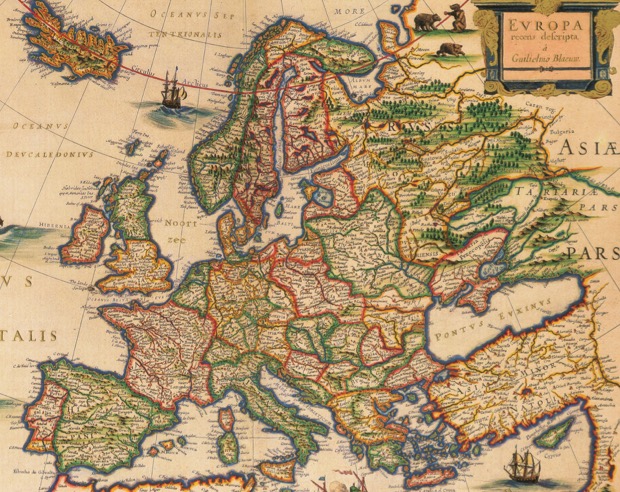Go Westphalian, Young Man

Resurgent national sovereignty movements are back and validated by expanding electoral mandates.
This essay is adapted from Tyrmand’s speech on “Freedom, Sovereignty, and Individual Rights” delivered October 5th, 2019 in Los Angeles at the American Freedom Alliance (AFA) Conference on Global Populist Movements. –Eds.
Firstly, thank you all for being here. Special thanks to Karen Siegemund for organizing this conference, here in beautiful Southern California, at the very moment the Northeast is beginning to show its nasty seasonal underbelly.
I also want to say it’s an honor to be addressing so many political leaders from so many great nation-states, who are leading the charge on conserving sovereignty around the world. Many of you are from the place where established sovereignty is most under attack—the Old Continent, where sovereignty was philosophically birthed and put into action: Europe.
It will be a pleasure for me to talk for a few minutes today about the historical roots of popular sovereignty as well as how we got to where we currently are—with a developed-world political trend of rising nationalist, anti-establishment, populist, conservative, sovereignty-centric, right wing parties gaining ground, especially in Europe—the philosophical birthplace of the very idea of sovereignty.
I highlight sovereignty as the overriding thematic issue on which to focus, because it is only through “sovereignty” that freedom and individual rights are possible. Without recognized, respected, and fully upheld sovereignty, the entire premise of post-enlightenment Western political practice—modern representative democracy—is nullified.
This Western political tradition, which from 1648 on exalted nation-state sovereignty as a tenet of legitimate government, produced over three centuries of unrivaled expansion in every social good, first in the West and then ultimately to the world at large. Science, technology, market development, hygiene, diet, health, wellness, and longevity, poverty levels, education access—in short, all standards to which quality of life for a human being can be measured—measure better today than ever before and in every half-century or so measure better than in the antecedent one. It’s not a perfectly straight line graphically, but this trend has been powerful.
Westphalian Sovereignty and the West
In 1648 the Treaty of Westphalia was signed, reordering the political operations of Europe away from a practice of war as first resort and toward one of attempted diplomacy. The Treaty was signed by 109 parties over five months. The territorial agreements by the nation-states and the imperial states of the Holy Roman Empire took five years to hammer out. For this Westphalian Order to work, there had to be a recognition and acknowledgement of the agreed-upon positions each nation state maintained. The lasting legacy of this accord, that settled many of Europe’s existent issues of the time, was the inviolability of borders and non-interference in the domestic affairs of these now recognized sovereign states. This is the basis of the modern international order.
From this period on, Europe had set the stage for flourishing. The Enlightenment that soon followed gave us the classical liberal concepts geared toward maximizing liberty—delivering it and securing it. Social contract theory grounding government authority in the consent of the governed, political legitimacy, individual and natural rights, and ultimately representative democracy all had their roots in the stabilization of the European continental theater that the Westphalian Order delivered.
Of course there were still wars, territorial disputes, piracy, imperialism, and all sorts of other chicanery that those with political power will get into with other holders of political power. As Lord Acton suggested, those who maintain political power will most often also be replete with ambitions, moral failings, and sinister, self-interested and/or messianic motives. But that there was a new way to adjudicate disputes, through diplomatic engagement, bilaterally or multilaterally, changed the evolution of Western international relations. The historically important Congress of Vienna in 1815 was such an example of this in practice—an organized, civilized, and methodical airing of sovereign grievances that restored a stable balance of power to the European continent.
World Wars One and Two, with the developed world’s industrial-level technological capabilities, delivered death on a mechanized scale theretofore never seen. The power wielded and weaponized by one sovereign state actor—Germany—was motivated by imperial nationalist ambitions. The deeply battered Europe that survived, albeit with new fault lines such as the post-Yalta Eastern and Central European order, had many leaders who desired to remake the Continental political dynamic for a modern age.
In this postwar period, as the philosophers were philosophizing over what went wrong—how did this all happen?—they seized upon the nationalist component of German Nazi philosophy. This component of the Nazi ideology was viewed as the catalyst for the attempt at world domination. They ignored the socialist part of the Nazi platform, as they were prone to espouse this economic philosophy themselves.
It is not coincidental that the thought leadership was weighted toward the French philosophical schools of political and social thinkers, firmly ensconced on the left—in the academy and the state’s political complex. They were quick to condemn and blame the nationalism but not the socialism.
These were not great appreciators of Edmund Burke’s Reflections on the French Revolution—their revolution. His condemnation of the revolutionaries’ attack on French traditional institutions and their fervent predisposition to statism did not mesh with their “modern” philosophical worldview. Theirs was a worldview much closer to the one propagated by the Revolutionaries, and encapsulated by Robespierre’s and the Jacobins’ “Liberté, Égalité, Fraternité,” which—as Burke correctly predicted—would later be reduced to the absurd during the statist tyranny of the Reign of Terror.
Global Markets’ War Against Sovereignty
The idea that it was now time for a “United States of Europe,” which would combat the extreme nationalism that had just roiled the continent, gained immediate currency in the late ’40’s and early ’50’s. Initially this was to be built around values—human rights and democracy—rather than around economics and trade. Sovereign governments could choose to work together on their own volition, with no supranational authority.
By 1952, harmonization of political decision making was not aligning quickly enough for some of the more socialist and more integrationist in the pro-federation camp. So the “fathers of the European Union” including Monnet, Schuman, De Gasperi, and Spaak, initiated the European Coal and Steel Community with six original signatories. The ECSC was the first international organization to be based on the principles of supranationalism. It was a governing body built expressly to devolve power from the sovereign state, initially on a voluntary basis, to supranational authority. This was meant to regulate coal and steel—the two necessary inputs to wage industrial-level war. These also happened to be the two key industrial economic sectors of the time.
And so was the European Union born—the first true supranational governing authority in human history. This was a voluntary ceding of sovereignty, not catalyzed by being on the receiving end of a tank or a gun, but ushered in democratically. Free peoples, with the goal of war-less utopia, voted to devolve their statehoods to a federation.
Of course, many a coercive sales pitch was made by the growing Eurocracy in order to obtain popular support. And of course Schengen, and the free movement of people, goods, capital, and services, would unlock value. The economics of a monetary union and a common currency would reduce transaction costs and tie peoples more closely together. After all, those who make trade together, war less.
This multi-generational age of integration, harmonization on policy, and what the contemporary political descendants of the EU forefathers now fashionably call “cohesion,” stayed on trend. It deepened as the decades marched on, and did not abate for 60 years. In this more than half a century though, some curious byproducts of post-sovereign utopia manifested.
The economics of the common currency could only work when there was continual growth in the real economy or nominal growth by adding more consumers and adopters of the currency, like a Ponzi scheme. Bernard Connolly, Baroness Thatcher’s chosen economist to analyze the Exchange Rate Mechanism—how it would look giving up your sovereign currency for the common one (aptly named the Euro)—sounded the alarm that this would eventually lead to ruin once growth hit a wall. He was suspended and slandered in Brussels ad nauseum for his sound economics, but he did successfully keep the UK from trading in their Pounds, and with it their monetary sovereignty. His book The Rotten Heart of Europe (1995) is a must read for those interested in the economics that underpins the common currency’s natural pitfalls.
As Connolly pointed out, and as we later saw, shocks and recessions and even destabilizing political episodes could, would, and did prove disastrous. There was no remedy for European policymakers to seize upon that could be executed as guaranteed by the EU constitution and that wouldn’t be at odds with the national constitutions of member states. Fiscal policy and budgetary constructions were domestic issues definitionally: taxation and spending within a nation-state is an absolute underpinning of sovereignty. And the monetary policy of the European Central Bank (ECB) would impact different nations differently, so the determining motives on actions tended toward those that were beneficial for the biggest states—especially that one country with the biggest economy in Europe by far, Germany. That economy had been successfully rebuilt in the post-war era by factors such as the American-funded Marshall Plan, the prohibition on the German state from rebuilding its military, and a culture whose industriousness has been heralded for centuries—yes, culture does in fact matter. It always has and always will.
This particular byproduct of integration—the monetary policy as a backdoor to fiscal policy control—led directly to the reduced national sovereignty of a member nation. This occurred with the Greek Debt Crisis of 2009. Which lasted a lot longer than 2009—it could be argued that it still persists today a decade later. Without going too deep into the economics of the situation, Greece was well over their skis with a highly levered sovereign balance sheet, financed by cheap money as priced by the ECB, lent by German banks with overwhelming outstanding loan obligations on their own corporate balance sheets, and looking for profits with little regard for the systemic risk they were exacerbating with loose lending standards (probably learned from their American high finance cousins—another pernicious symptom of the Wall Street centric globalism we too often talk about).
After the American recession of 2008 went global, the malinvestment into the debtor states of the Club Med economies of Southern Europe, by the lender states of industrial northern Europe, with their large banking and investment systems, came to the forefront of global finance. There was potential for major banking collapses which, like the Wall Street subprime mess in America, may have led to a global banking contagion and crippling global depression. Or not. But the political and financial establishment of Europe—in Brussels and Germany and France, etc. were not open to discovering this organically. Because even if there could have been a reorganization of European financial institutions amidst Southern European debt write-downs, many large politically connected banks, mostly German, would have failed. Deutsche Bank is still at risk today, and I do believe it is functionally insolvent—kept alive only by ECB policies that allow it to remain near comatose (see its current moribund share price).
As a result of these political gyrations, Greece fully lost its sovereignty and became a debt vassal to the private component of the banking system of the supranational governance authority. Prime Minister George Papandreou was replaced by a former Vice President of the ECB in a snap electoral process, wherein the pro-EU political and media voices weighed in vocally about a falling sky should the Greeks not validate the steward Brussels had selected for them. This steward, Lucas Papademos, orchestrated an EU-constructed “bailout.” Truth be told, though, it wasn’t a bailout per se given the crippling austerity the Greeks had foisted upon them by the European supranational authority, nicknamed the Troika. The Troika was made up of the European Commission—the politburo of the EU, so to speak—the ECB, and the IMF. Unemployment predictably spiked, while Greece lost a generation and is in a malaise that it has yet to recover from, with no real end in sight.
Distasteful Results of Diminished Sovereignty
This is just one example, and up to that point it was the grandest in scale, of a single nation-state’s sovereignty diminished by EU pressures or diktats. Greece might have come out of this economic crisis with different outcomes had they been allowed to return to their pre-Euro currency, the drachma. Or even exit the EU. But these options never had an honest chance to be put to the Greek people, as a departure from the federation may have had ripple effects that the establishment was not going to experiment with. This was anathema to them and put their whole agenda of deeper integration at the risk of unraveling. They wanted more integration, not dis-integration. It is clear that in this case, diminished sovereignty led to a reduction in freedom for the Greek people.
There are many such examples in the post-2008 world, the moment when the global economy teetered on the brink of what potentially would have been a deleteriously chaotic time for the political establishment. The EU leadership, the nations, and those political classes heavily invested in the economics of the EU and the philosophy of the EU, could not let this happen. What happened with Greece happened similarly in Italy a year later—when an EU-aligned technocrat, Mario Monti, received a threadbare mandate, became Prime Minister, and installed a fully unelected technocrat government to implement austerity. Legitimacy in the EU, in the enlightened classical liberal Hobbesian and Lockean sense, was not so much of a concern to the integrationists. Only the appearance thereof in so much as they could maintain a rhetorical fig leaf.
There were referendums, such as Lisbon, where the votes for deeper alignment and/or integration were rejected. So the results of rejection were duly rejected and the referendums held again at times guaranteed to produce lower turnout and “positive” outcomes of “more Europe.”
Recently, again in Italy, the EU has put their hand on the scales to encourage a restructuring of government as a vociferously hostile populist, nationalist, conservative political party leader—the most popular politician in the country—has been scuttled. I of course am speaking of Matteo Salvini, who was a thorn in the side of the Euro-centric Brussels establishment over issues like borders, unfettered migration, and the sovereign decision-making capacity of his country, He, like seemingly 70% or so of his countrymen, want more of it—their sovereignty—back. Imperial Brussels, like Rome 2000 years ago, would prefer to hold on to the sovereignty of those societies that comprise its far-flung membership.
And of course we have Brexit, the first moment that may prove to be the inflection. After 60 years of integration, here was the first reversal of the agglomerating trend. With the United Kingdom, having been one of the greatest and earliest proponents of codified rule of law, it was fitting that this island, geographically apart from the continent, led this charge demanding the return of their sovereignty. The Brexit movement had germinated for years, but by 2016, the Brits decided they’d had enough and they called the referendum. This was the greatest thing David Cameron ever did in his whole life—and he is deeply, depressively regretful over it. Go figure. There were so many issues the Brits had felt they were getting the short end of the stick on. Whether it was balance of payments, basic economic cost vs. benefit, the fishing rights to their ancestral waters, regulations on the electrical output of their tea kettles and toasters and even discussion of outright bans, migration quotas and mandates, a litany of protectionist policies that the continentals were foisting upon their island neighbors, etc. etc.—the Brits wanted out.
Or, at a minimum, they wanted to see if their countrymen also wanted out. They voted, and despite the scare tactics of those aligned with the Eurocentrist worldview, the people spoke in favor of exiting the federation. (And I for one, listened to the soundtrack of Les Mis on a loop all through that entire wonderful, fateful night—the irony of this soundtrack being an idealization of the French Revolution was not lost on me.)
Negotiating the exit exposed the real face of this technocratic leviathan and laid it bare for all Brits, Europeans, and the world to see. The Eurocrats slow-walking of attempted points of agreement for exit, the ignored entreaties from democratically elected representatives (even still with a party called the Brexit party receiving the biggest mandate from the British electorate this past May for the European Parliament), the punitive separation fine, the threat of spiteful treatment with regard to trade with British industry, E.U. Parliament Member Guy Verhofstadt joking about guillotines (now this guy, Guy, is a prime candidate to read Burke), commissioners on video drinking wine and joking about making the Brits suffer for leaving, etc. all were indications of the true character of the proponents of “more Europe.”
If you believe in the state and governmental bodies with a fervor that is bordering on religious, the E.U. can do no wrong. Establishment leftist and technocratic states are the answer to what ails society, even after sovereignty is visibly shredded and frayed and broken. But I believe there is a silent majority in every educated and developed society that instinctively knows when their freedom is being taken away. It’s easy to see it and feel it when it happens by force, such as in the Sovietization of Central Europe after Yalta. It is a lot tougher to feel it when you are a lobster in a pot, when the water starts off warm and continues to rise in temperature—until you are boiled. Brexit was a boiling point. More Europeans than ever are coming to realize the E.U. is the equivalent to the lobster pot. Sixty plus years of rising water temperatures boiling away European sovereignty has opened a lot of eyes.
In Central Europe, nations who exited the Iron Curtain remember what having decades of lost sovereignty was like. As this was their direct experience and still in their collective current memory, they see what this project has become. This is true especially vis-à-vis the V4 countries, Central Europe’s economic anchor, Poland, and its now political anchor, Hungary—led by a strong nationalist, populist, conservative in Viktor Orban. They see what the E.U. is attempting to do to their sovereignty: immigrant quotas and inserting hostile third world unassimilable economic migrants, steeped in an Islamism that doesn’t mesh with their pious Catholicism, by fiat. Imposing sanctions and censures such as Article 7 to strip nations with elected leaders and honest mandates of their European parliamentary voting rights for doing what their peoples elected them to do—for defending their sovereign borders, or reforming corrupt post-communist systems, such as the judiciary in Poland. Or, getting foreign activist money, meant to coercively undermine their society, out of their political debate, such as the public battles over NGOs in Hungary. (To the Eurocrats, these examples are cited as violations of “European values”—whatever those might be at the moment.) And then to watch these politically pro-Israel countries, standing with Israel against BDS, a stance antithetical to that of the culturally relativist EU establishment, be labeled anti-Semites, is a farce. This weaponization of identity politics, as the developed-world Left plays the world over, does not endear conservative and politically right of center societies to the EU.
The breakdown of freedom that has been the derivative effect from the breakdown of sovereignty has led to many of the same mental calisthenics Burke warned of in his French revolution analysis. To achieve ultimate “Égalité” and “Fraternité,” the “Liberté” must be hindered, subdued, and even suborned. In this, the right of the individual is made subservient to the state, or super-state as the case may be, when the state is not already complicit in European establishment value systems. When one cannot express the honest truth for fear of legal retribution—whether it be hate speech laws, or free press muzzles such those which come with failed migrant and refugee assimilation and over-the-top third-world ghettoization (the infamous “no-go zones”), the trust in the federation plummets. We all remember Cologne’s New Year’s festivities a few years ago: a coordinated intervention to silence the press, for those who were not already willingly aligned with the message the establishment wanted propagated. This is happening in many European nations- and this is being called a “defense of European values.”
I am old enough to remember when European values amounted not to pure cultural relativism, but rather to an openness to inquiry and debate and discourse. Okay, you got me, I am not really old enough to remember that, but I did read about it, in books, not yet banned.
European values for centuries were also oriented around science and discovery and rational reasonable thought. They’re why Europe flourished as a competitive group of nation-states. It was not mentally obtuse double standards that led to societal success. When a march on Poland’s annual mid-November independence day was staged by patriots holding the Polish flag, this was treated as tantamount in the European political establishments’ salons to “fascist nationalists are marching, this is an affront to human rights.” But meanwhile, nary a word is uttered when French President Macron turns the hoses on the unarmed Yellow Vest protestors. These are the ignored working-class masses taking to the streets to express economic dissatisfaction with a government ignoring their wellbeing as citizens. And when an elderly pensioner is killed or tear gas is used, there is no highfalutin rhetoric out of Brussels wherein “rule of law is under attack” or “human rights violations” must be called out. A double standard this brazen opens many eyes.
The Green Shoots of Sovereign Hopes Spring Eternal
All of these are the effects. The cause has been the disintegration of the Westphalian sovereign order in favor of supranational governance. But as with alcoholism, and the 12-step program, admitting you have a problem is the first step. Where does that leave us? I am happy to say, I do not think it leaves us in such a bad place. The integration pendulum has swung too far. And now there is a rise in the populist, nationalist, anti-globalist, conservative, right-wing, Westphalian(!), patriotic movement cohort across Europe.
Central Europe led the way, not surprisingly given their experience with broken sovereignty and fiat rule foisted by far-off Moscow-based mandarins who maintained dictatorial power backed up by military force. During Hungarian Prime Minister Viktor Orban’s recent terms (PM for the second time, and now since 2010), he was loudly vocal about these issues of sovereignty and borders and culture. He spoke out with the Hungarian people firmly behind him.
Poland, under Law & Justice, is not Eurosceptic per se, as they do believe in integration more than many right-wing nationalist and populist European parties do these days. But they are strong on retaining their sovereignty and on protecting their country from far-off leftist technocrat overreach. In Germany, AfD is now a consistent player in local, regional, national, and European elections. In the Netherlands, Forum for Democracy under Thierry Baudet is gaining strength. Marine Le Pen and her National Front (now National Rally) received around 1/3 of the vote for president in the second round of the 2017 French presidential race. A third! In Eurocentric France no less—the ideological driver of the EU project, with its political philosophical, academic culture rooted so firmly in the Jacobin post-Revolution which Burke so perfectly diagnosed. That was a very powerful showing. And yes there are ebbs and flows in these election cycles. But the most important thing is trend, and the trend is in favor of a slowing and a cessation of devolution of sovereignty to the supranational governance beast. Before there can be a full reversal, and a validated inflection, there has to be a net slowing and then a complete halting of the integrationist trend. Only then can this reversal become the new trend.
There are many green shoots of this growth in national populism that should engender optimism. When there are rising movements such as these in a society as institutionally far to the left as Sweden—where Swedish Democrats are growing cycle over cycle—this is a good data point. In a recent poll the Swedish Dems are tied for first nationally with nearly a quarter of the electorate’s support. Or in Spain, home of the short workday and the long siesta, a country where socialism beats proudly in many a citizen’s chest, the rise of Vox is a material validating data point.
I want to close with three quotes from a recent world leader’s speech that should give all of us much hope who are looking for a world with competitive sovereignties putting their best feet forward, bringing forth their comparative advantages in honest mutually beneficial collaboration, bilaterally or multilaterally, of their own volition, with no coercion.
This speech was delivered by the most powerful pro sovereignty leader in the world in a building that is the quintessential symbol of global supranational governance. He is a leading voice for patriotic nationalism, classical liberal values—i.e., conservative ones, ones that exalt freedom and liberty. He is a populist: he trusts the will of the people far more than that of the unaccountable, self-interested, oft-cloistered elites who disdain the masses He is a competitor, a vanquisher of the globalist, open-borders sowers of chaos and the deconstructionists of the great institutions and values of Western Civilization. I speak, of course, of Donald Trump, the American President, and these are from his speech at the United Nations General Assembly a few weeks ago. Not surprisingly, this gem of a speech was smothered and completely memory holed, in best Pravda practices, by the mainstream press.
Here are just a few snippets:
Our time is one of great contests, high stakes, and clear choices. The essential divide that runs all around the world, and throughout history, is once again thrown into stark relief. It is the divide between those whose thirst for control deludes them into thinking that they are destined to rule over others and those people and nations who want only to rule themselves. I have the immense privilege of addressing you today as the elected leader of a nation that prizes liberty, independence, and self-government above all.
The free world must embrace its national foundations. It must not attempt to erase them or replace them. Looking around and all over this large, magnificent planet. The truth is plain to see. If you want freedom, take pride in your country. If you want democracy, hold on to your sovereignty. And if you want peace, love your nation. Wise leaders always put the good of their own people and their own country first. The future does not belong to globalists, the future belongs to patriots. The future belongs to sovereign and independent nations who protect their citizens, respect their neighbors, and honor the differences that make each country special and unique.
Patriots see a nation, and its destiny, in ways no one else can. Liberty is only preserved, sovereignty is only secured, democracy is only sustained, greatness is only realized, by the will and devotion of patriots.
If ever there was a moment to be optimistic about a resurgent Westphalian Order, it would be this one: the most powerful leader on the planet, delivering these words on the floor of that United Nations, to every-nation state leader of the world in one room. It just makes one’s heart sing. I think we are going to be just fine, ladies and gentlemen. Thank you very much.
The American Mind presents a range of perspectives. Views are writers’ own and do not necessarily represent those of The Claremont Institute.
The American Mind is a publication of the Claremont Institute, a non-profit 501(c)(3) organization, dedicated to restoring the principles of the American Founding to their rightful, preeminent authority in our national life. Interested in supporting our work? Gifts to the Claremont Institute are tax-deductible.
Reform, not Twitter, is what the Church needs.
tfw the dating app is creepier than the date.
A Statement from the Claremont Institute
Notes from the convention that wasn’t.
A Statement from The American Mind.






